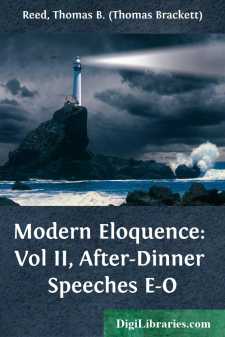Categories
- Antiques & Collectibles 13
- Architecture 36
- Art 48
- Bibles 22
- Biography & Autobiography 813
- Body, Mind & Spirit 142
- Business & Economics 28
- Children's Books 14
- Children's Fiction 11
- Computers 4
- Cooking 94
- Crafts & Hobbies 4
- Drama 346
- Education 46
- Family & Relationships 57
- Fiction 11829
- Games 19
- Gardening 17
- Health & Fitness 34
- History 1377
- House & Home 1
- Humor 147
- Juvenile Fiction 1873
- Juvenile Nonfiction 202
- Language Arts & Disciplines 88
- Law 16
- Literary Collections 686
- Literary Criticism 179
- Mathematics 13
- Medical 41
- Music 40
- Nature 179
- Non-Classifiable 1768
- Performing Arts 7
- Periodicals 1453
- Philosophy 64
- Photography 2
- Poetry 896
- Political Science 203
- Psychology 42
- Reference 154
- Religion 513
- Science 126
- Self-Help 84
- Social Science 81
- Sports & Recreation 34
- Study Aids 3
- Technology & Engineering 59
- Transportation 23
- Travel 463
- True Crime 29
Modern Eloquence: Vol II, After-Dinner Speeches E-O
Categories:
Description:
Excerpt
GEORGE CARY EGGLESTON
SOUTHERN LITERATURE
[Speech of George Cary Eggleston at the first annual banquet of the New York Southern Society, February 22, 1887. Algernon Sidney Sullivan, President of the Society, was in the chair. In introducing the speaker Mr. Sullivan said: "We want to hear a word about 'Southern Literature,' and we will now call upon Mr. George Cary Eggleston to respond to that sentiment."]
Mr. President:—I have cheered myself so hoarse that I do not think I can make a speech at all. I will say a word or two if my voice holds out. It is patriotically hoarse.
If I manage to make a speech it will be the one speech of the evening which was most carefully prepared. The preparations were all made, arrangements were completed and it was perfectly understood that I should not make it. The name set down under this toast is that of Hon. John Randolph Tucker, and the wild absurdity of asking a writer who does not make speeches, to take the place of such an orator as John Randolph Tucker would seem to be like asking a seasick land-lubber to take the captain's place upon the bridge of the ocean steamer in a storm, and there is another reason by which I am peculiarly unfit to speak in response to the toast—"Southern Literature," and that is, that I am firmly convinced that there is no Southern Literature; that there never was a Southern Literature; that there never will be a Southern Literature, and that there never ought to be a Southern Literature. Some very great and noble work in literature has been produced by men of Southern lineage and birth and residence. John Marshall, if he had not been the greatest of American jurists, would have been counted, because of his "Life of Washington," the greatest of biographers. I might name an extended list of workers in this field, all of Southern birth. Sims; my dead friend, John Esten Cooke; his brother, Philip Cooke; Cable, who is married to New England; the gifted woman who calls herself Charles Egbert Craddock; and a host of others including that noble woman now going blind in Lexington, who has done some of the sweetest work in American poetry, Margaret J. Preston. [Applause.] I might go further and claim Howells, every drop of whose blood is Virginian. If it were not getting personal and becoming a family affair, I might mention the fact that the author of the "Hoosier Schoolmaster," with whom I used to play on the hills of Ohio River, was of direct Southern descent; that he was born as I was, exactly on Mason and Dixon's line, and one of us fell over on one side and the other on the other when the trouble came.
Notwithstanding all this, I hold that there can be no such thing as a Southern Literature, because literature is never provincial, and to say of any literature that it is Southern or Western or Northern or Eastern is to say that it is a provincial utterance and not a literature. The work to which I have referred is American literature. It is work of which American literature is proud and will ever be proud, whatever is worthy in literature or in achievement of any kind in any part of the country goes ultimately in the common fund of American literature or of American achievement; and that is the joy I have had in being here to-night, when I ought to have been at home....


